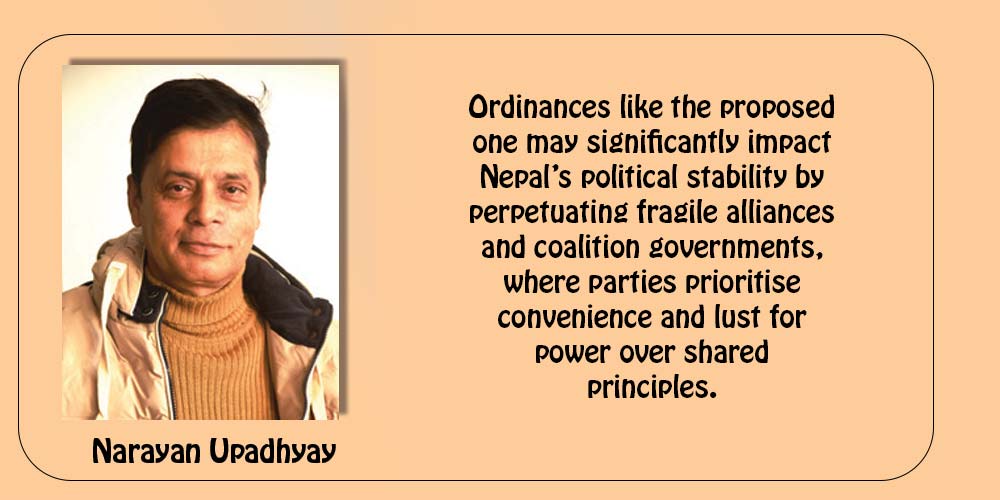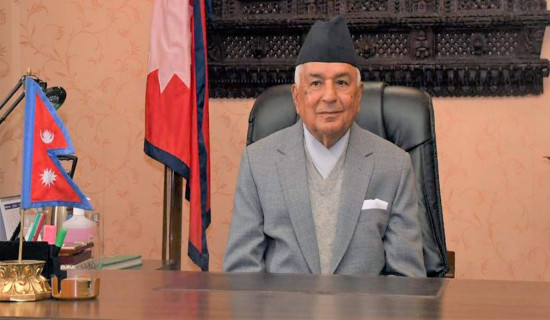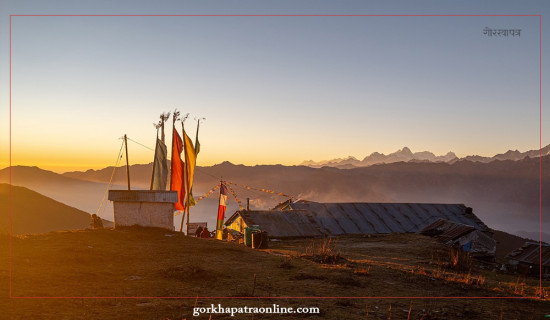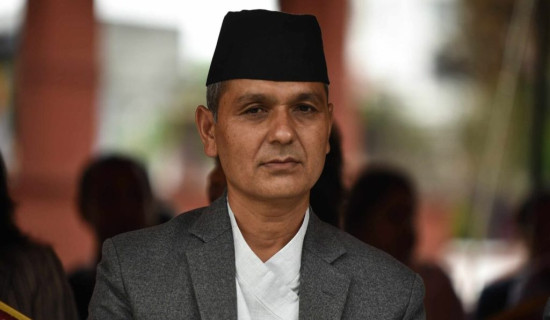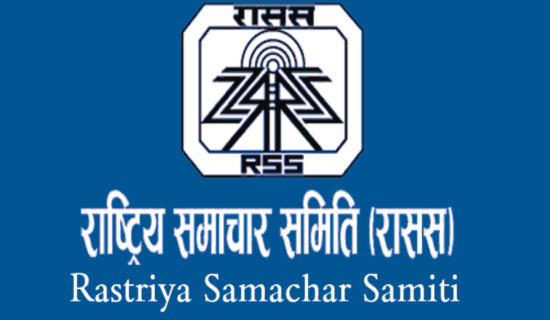- Thursday, 19 February 2026
Smaller Parties At Receiving End?
The grapevine in the country is abuzz with reports that the government is considering amending the law on political parties through an ordinance. Despite the government and coalition parties’ assertion that the proposed ordinance aims to promote flexibility and enhance internal democracy within the country’s political parties, many perceive the ordinance as making party splits easier.
Aimed at amending Political Parties Act, 2073 BS, the proposed ordinance is intended for facilitating party splits by adjusting the required percentage of party members’ support for such splits. According to the current law, a political party can divide if 40 per cent of its central committee members and federal parliament members approve such a move. For preserving overall political stability and cohesion within parties, the 40 per cent requirement has been crucial for avoiding swift fragmentation in parties. However, the proposed ordinance will lower this limits to 20 per cent, permitting splinter factions with 20 per cent of the central committee and federal parliament members to form a new party within the bounds of the law.
Ordinance
Some three years ago, Nepali Congress president Sher Bahadur Deuba’s government introduced a similar ordinance, which helped his government survive by receiving the required number of votes from the then parliamentarians. Deuba became the head of the government with the support of the CPN-Maoist Centre and a group of CPN (UML) leaders who rebelled against party chair KP Sharma Oli. After the split from UML, dissidents formed CPN (Unified Socialist) with Madhav Kumar Nepal as the head, using an ordinance permitting 20 per cent of members to break away and create a new party. Initially causing a division within the UML, the ordinance later became void after the government did not table it to parliament for approval to become a law. This revived the Political Party Act 2073 BS, which maintained the threshold of 40 per cent.
It is expected that the new ordinance will lead to divisions within political factions of parties like the Unified Socialist and Rastriya Swatantra Party (RSP) as well as Loktantrik Samajbadi Party, as reports indicate leaders forming factions and expressing disagreements with their party leadership. Causing a divide within parties is a move of the UML that is intended to weaken the opposition and boost its standing. Several Unified Socialist federal parliamentarians, such as Prem Ale, Kishan Shrestha, and Dhan Bahadur Buda, along with Ram Kumari Jhankri and some central committee members, are considering rejoining the UML because of issues with the party leadership. Chair Nepal, however, dismissed the claim that his party would split after the ordinance’s introduction and cited that it would not impact his party, which, according to him, has stood on a firm ideological foundation.
The ordinance could help certain RSP leaders create their own party due to their dissatisfaction with their current party chair Rabi Lamichhane, who is currently in police custody for alleged involvement in embezzling cooperative funds. These leaders at present are reluctant to speak against his fearing backlash. Likewise, the proposed ordinance may trigger a split in Mahantha Thakur’s party, especially among central committee members who lack a strong rapport with Thakur, the party chair.
The soon-to-be implemented ordinance would strengthen the Ashok Rai-led Janata Samajbadi Party (JSP), which had broken away from its original party under Upendra Yadav’s leadership. Leader Rai, who was a UML leader in the past, and his party is now the part of the coalition government headed by Oli. Meanwhile, Yadav’s party, which suffered through a split following the Pushpa Kamal Dahal Prachanda-led government’s orchestration, moved the Supreme Court, questioning the National Election Commission’s move to grant Rai’s splinter group a political party’s status despite the group then lacking 40 per cent of central committee members or federal parliamentarians, a requirement as per the constitution, to fulfil the constitutional obligation to become an independent political entity.
As the pace for bringing the new ordinance gathers steam, leaders such as Unified Socialist chair Nepal, Prachanda, and several others met with the President and Nepali Congress chief Deuba to pressurise them not to help the government introduce the ordinance. President Ram Chandra Paudel, however, explained to these leaders that his constitutional obligations will prevent him from stopping any government-sponsored ordinance.
Reports also claimed that Deuba rejected the ordinance initially, but later has agreed for its introduction after a prolonged discussion with the PM. If some dissident Unified Socialist leaders opt to come back to the UML, it could aid the second largest party in parliament to become the largest party. Nevertheless, the NC and its president need not worry about the UML chair hindering his path to becoming the next prime minister, as agreed upon during the formation of the current coalition government under Oli. This time, the two major parties are obligated by their agreement that Oli will pass the government rein to the NC president after two years and Deuba will govern until the next election due in November 2027.
Impact
According to political analysts, ordinances like the proposed one may significantly impact Nepal’s political stability by perpetuating fragile alliances and coalition governments, where parties prioritise convenience and lust for power over shared principles. Implementing an ordinance that makes party divisions easier could make political alliances even more temporary. Effective governance might be hindered as trust in the political process diminishes due to the outcomes caused by ordinances.
Meanwhile, using ordinances for political convenience goes against constitutional principles. To maintain lawmakers’ scrutiny and vetting process, it is imperative that parliament thoroughly debate any amendments to the laws concerning political parties. Upholding transparency and thoughtful decision-making would help sustain the spirit and values of our constitution, which emphasises stability, integrity, and unity in our political structure.
(Upadhyay is a former managing editor of this daily.)

